Whether you are facing writers block when it comes to your vows or your loved one turned officiant is new to performing marriage ceremonies, Tanya Pushkine is here to save the day! Tanya explains how she as The Vow Whisperer is empowering couples, officiants, and those giving speeches at weddings to confidently give heartfelt moving speeches that set the tone for the whole wedding day. Tanya’s wisdom and experience will help you feel more confident and more in control of what those who will be holding a microphone on your wedding day will say. She’ll also make sure you feel comfortable writing vows to your soon-to-be-spouse.
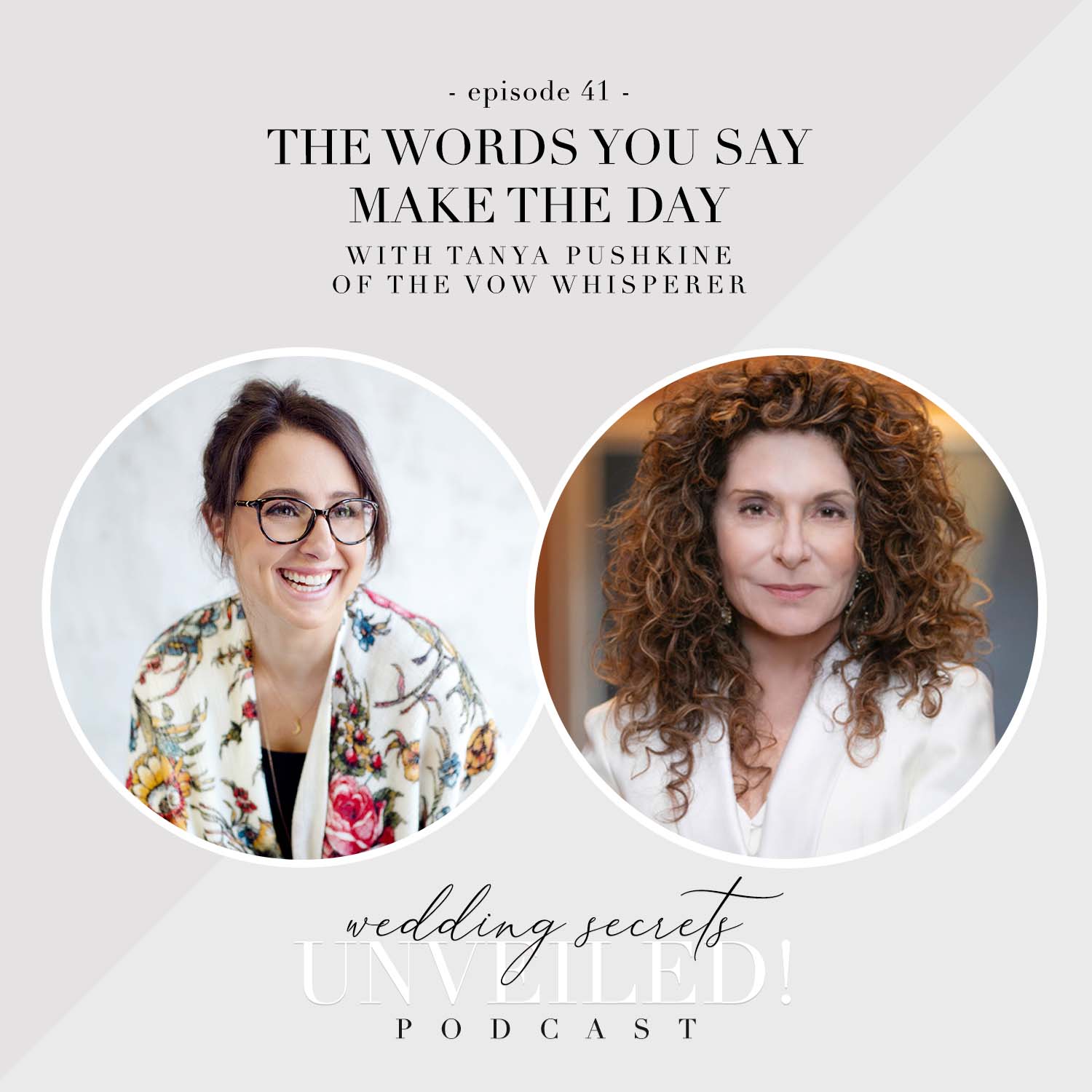
Meet Tanya.
So, I started a business called The Vow Whisperer just under three years ago. I am essentially a vow coach! It’s one of my titles – I help couples write vows but in their own words. I’m also an officiant and I coach non-professional officiants, like family or friends who want to officiate. Finally, I help write speeches and toasts.
So, you have three parts to your business?
Actually, it’s a little bit more… because the coaching of the officiant is also ceremony planning. There are plenty of couples who come to me because they want to have more control of their ceremony. So I do a lot of planning of the ceremony itself.
How did you get into all of this?
Great question. I got remarried three years ago, and it was covered by the New York Times in one of those full page vow features. The writer came up to me after the ceremony and she said, “Tanya, I’ve covered hundreds and hundreds of weddings for the New York Times, and I’ve never seen a more beautiful ceremony.” The next thing out of her mouth was, “I think you need to do something about this. Think about it, quit your day job, do something in the wedding industry. This is where you belong.” And so it was a calling in a way.
The following week, I had lunch with one of the guests from the wedding. During the lunch, I mentioned the idea and they said to me I was the “Vow Whisperer”. That night, I got my URL and quit my job.
Wow. You basically started a whole part of the wedding industry. Do you only work with local couples?
Thank you for saying that – I did. And, I am global. In fact, the vow work is remote. It always has been even pre-pandemic. I have clients all over the world. Oh, I also work in other languages. The vow work or coaching someone to officiate can all be done over Zoom. The only thing I can’t do via Zoom is officiate, but I’ve traveled to do that. I actually just got back from the most epic wedding on top of the mountain, it was unbelievable.
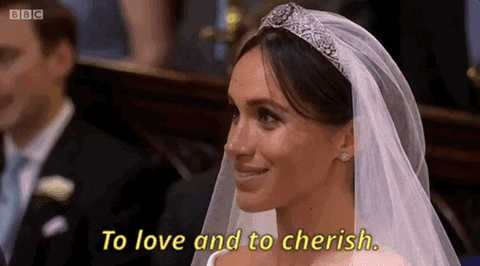
Can you explain more to our listeners about your vow writing process?
Of course, when a couple decides that they want to write their own vows, inevitably it becomes a bit of a breakdown moment for at least one of them. The worry of: how am I going to pull this off, I don’t know where to start, I’m scared to speak… So getting a little help can be wonderful. Once I’m hired, I send out a questionnaire. I ask them to sit with that questionnaire for at least a month. It asks you to be reflective on your memories, stories, anecdotes, moments together, your proposal, and so much more. It’s a working document and I encourage them to come back to it over that month. Once it comes back to me, I take those answers – and this is important to note, I’m not the writer. I’m using their words. I formulate a first draft for them and it becomes a very collaborative process back and forth, until they’re happy with it.
Then the next part of the process begins: the delivery. You can write the most gorgeous words ever, but if you’re really monotone when you deliver, it won’t matter. So, I coach my couples on delivery – how to stand, eye contact, pronunciation, even how to use a microphone properly. I want to get couples over that fear of public speaking so that we get to the point that they’re so confident the nervousness goes away because they’ve delivered it so much.
Can you go over a little of the common mistakes that couples run into when they are doing their vows or some of the biggest challenges?
There are several, if they’re doing this on their own, and if they’re googling how to write your own vows. That’s enough to put me in a mental hospital, ha! That right there is so overwhelming and inundating. But, what I find with my couples is that when they sit down to write, it just doesn’t come to them. That’s a big issue. So, in those cases, I can interview the individual and probe until I get answers back.
Do the couples work on writing their vows together?
I do speak to them together on the initial call, but that’s the only time we’ll chat on the same call. I want their vows to be top secret for each other – I even ask them to promise not to discuss anything. The whole process is deeply personal. Sometimes it’s not easy!
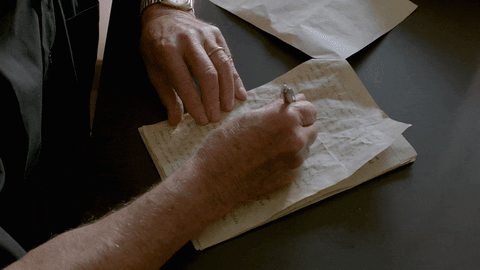
Before we get into the speech writing, how do you help prepare people for public speaking on a wedding day?
It’s one word, it’s called practice. I promise you that. The more you practice, whether it’s a speech, whether it’s your vows, whatever it is… practicing and breathing is the important part. You’ve got to breathe. The more people practice, with me or out loud in front of the mirror, the better.
I bet because it’s a whole process, it helps! Before I ask you about helping the bridal party, I want to share a tip from this old-fashioned photographer – use paper for your speeches! It just looks nicer. How do you help the bridal party with their speeches?
Of course, toasts and speeches are inevitably the one thing that you always hear when someone’s been to a wedding. They’ll say oh my god, the speeches just went on and on and on and on. And that is right there a killer to the reception. I think that speeches should not be more than three or four minutes long, Max. No TMI. This is not a roasting session. It really must be thought out and when I work with someone on a speech, we really narrow it down to a theme. So it becomes a becomes concise. It has everything you want to say in it. It’s short and sweet. No matter who it is, we start with the pen to paper and decide what they want to include from their brain dump of ideas after narrowing it down. Then I edit it and the process is like the vows, but a bit shorter.
What is pricing like for vow or speech writing?
My entire business is a tiny blip on a wedding budget, it is nothing. But what happens is that so often, thinking about your ceremony, your vows, your speeches, whatever it is last minute, and that’s the problem. Because not only is it last minute, and you don’t really have the time to put into it, but now you’ve run out of money. So, I really do believe that ceremony writing should be a priority. It should be one of the first things you think about, hire your officiant or your rabbi, whoever you’re going to hire. If you’re going to do vows, think about hiring a writer early on. I won’t name exact numbers but it’s less than your floral budget or a photographer.
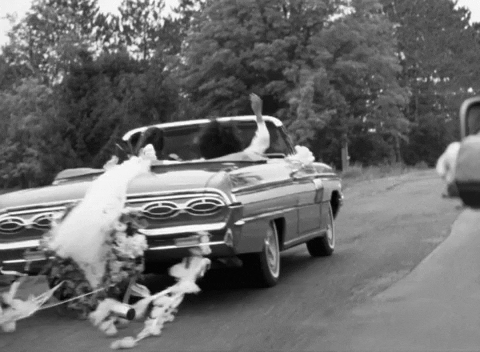
Let’s talk about the other part of your business. Can you tell me about your process as an officiant?
Absolutely. I wasn’t an officiant when I started the business. It came because some of the couples I was working with hadn’t hired an officiant and would ask me if I could marry them. So, I said why not? That’s how I became an officiant! I approach it very differently than other officiants. I’m not saying
in a better or worse way because everybody’s got their system, and that’s fine. But I do believe that a couple should be in complete control of what is done in their ceremony. I am not an officiant who will craft a ceremony and hand it to the couple of weeks before the wedding and say, “See you next Saturday.” That’s not me.
Like writing vows, it’s extremely collaborative. We explore so many avenues of what should be included in the ceremony. I’ll give them choices for every element – from the ring exchange, how we talk about marriage, the declaration of intent… They’re empowered to create their own ceremony. I’ll always do research too, if it’s a multicultural wedding. I love those! I love finding ways to incorporate what matters in those cultures into the ceremony.
It really is a perfect scenario, especially if I’ve worked on their vows with them, because it’s not like a stranger is marrying them then.
I also love the fact that you offer support to family or friends who will be officiants. Does the couple pay for that or the officiant?
Really good question. It’s usually the couple that will pay for it. Because they want to make absolutely sure that this is going to get done right. It works the same way as if I was doing the ceremony: we craft it all with the couple, which takes a weight off the friend or family who is offering to help. I’ll also help the officiant craft an opening for the ceremony – about why they’re the ones standing up there officiating. We go through the logistics – even things like stepping out of the way for the first kiss photo! Of course, we also go over how to get ordained and practice so there’s no fear of public speaking in that situation. So it’s, it’s all of the how to run a ceremony like a pro. The best compliment I get is, after the wedding, when that friend or family is asked to officiate another wedding. That means I’ve done my job.
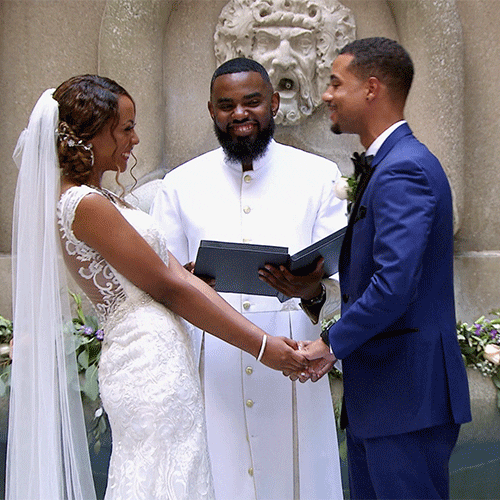
Can you go over some pros and cons of having a family member officiate your wedding?
The personal connection is a huge pro. And I always get confirmation of that when we’re working on someone’s story. That’s a beautiful thing. You’re not getting married by a stranger, you’re getting married by somebody who knows you really well. I will tell you though, when I officiate a wedding where I’ve worked on the vows with that couple, that’s the perfect scenario, because they’re not getting married by stranger, I get to know them better than their own therapists do. I mean, they I’m a friend, by the time I’m standing there, I know every little tiny intricate detail about their relationship. So they’re not getting married by a stranger.
But for the first time at the wedding, let’s talk about the cons. I think the cons is somebody who is terrified of speaking in public or does not know how to write a ceremony.. it can be hard. If they don’t know how to do the logistics or properly hasn’t done the right research, the whole thing can go south. And it can be really boring. I think the couple needs to really be involved in the crafting of that ceremony and not let that person just go rogue.
What is your approach to being an officiant?
My approach, I think, is different than most officiant. I believe that a ceremony has to be about their words. The goal is for guests to walk away saying that was “so them”, and the way that happens is by crafting it with the couple. It’s a super collaborative scenario for us. It’s very much about choices. I want that couples to be completely in control of what they’re about to hear, except for their vows. And except for if Uncle Johnny’s doing it, his story. Everything else I think they need to know and be part of the process.
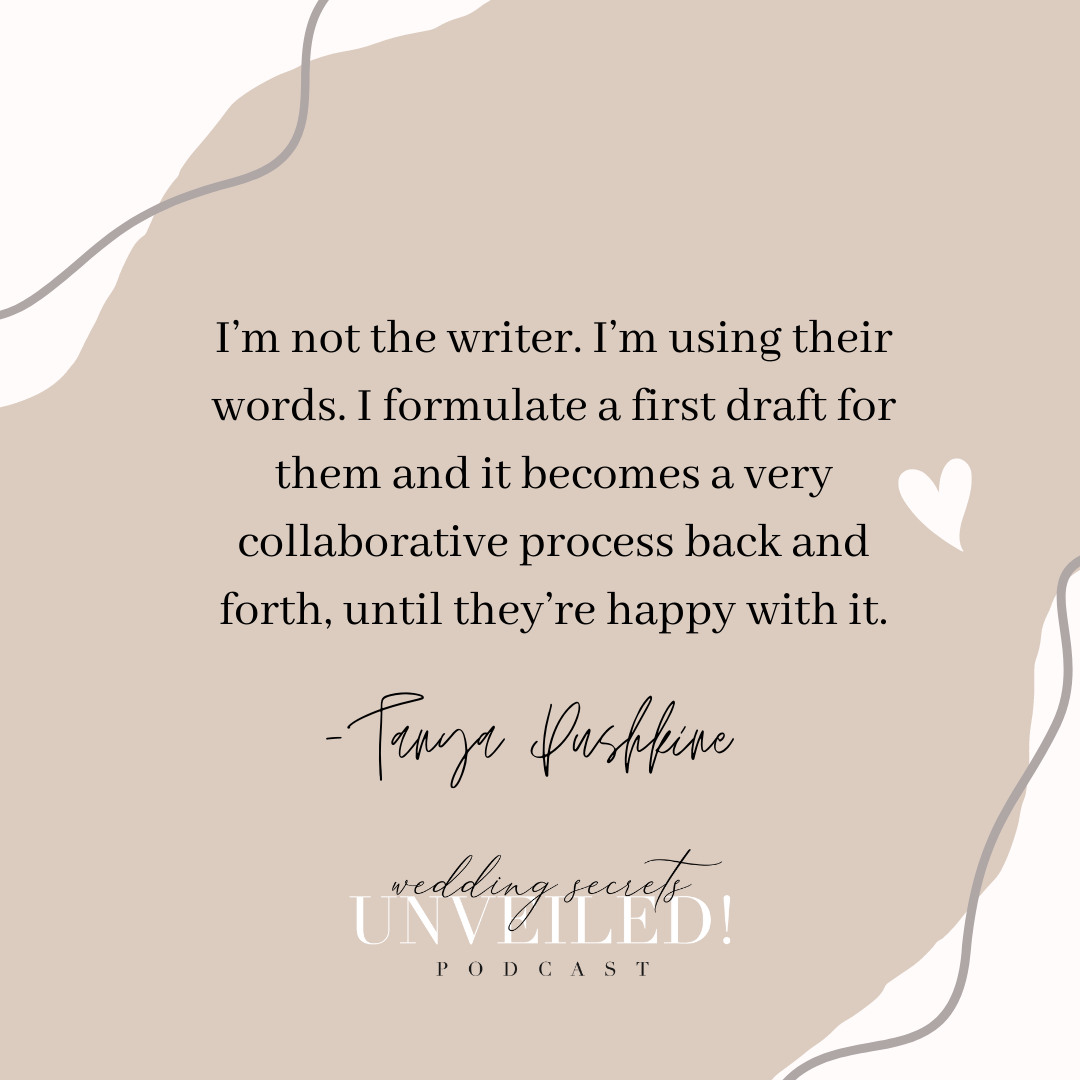
Wrap-Up Question
What some key points that couples should be thinking about when they’re writing their own vows to make sure that their wedding day is going to be absolutely perfect?
I think if you’re writing your own vows, keep a top secret.
Have a discussion before you start writing and get on the same page about the number of words and length of your vows.
Think about having a trusted family member review your vows and make sure the tone and feeling is on the same page! .
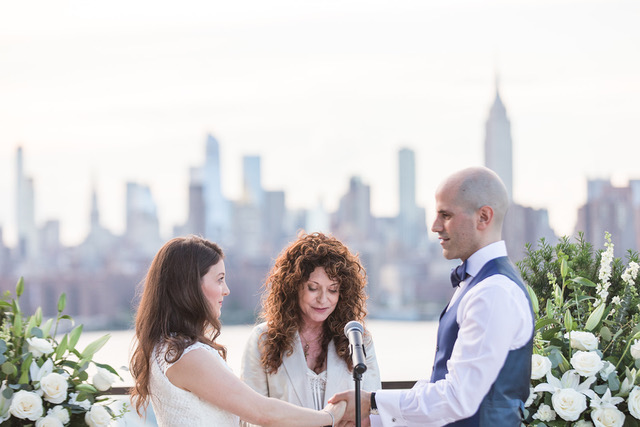
What We Discussed
How Tanya became the Vow Whisperer (3:46)
Common mistakes couples make when writing their own vows (9:55)
How Tanya helps your wedding party prepare for speeches (16:00)
The cost of a writer for your vows + speeches (20:37)
Tanya’s approach to helping a family/friend officiant prepare (25:16)
Wrap-Up Question (37:17)
Links Mentioned in the Episode
You can find the Vow Whisperer: Website | Instagram | Facebook
You can subscribe to this podcast from wherever you’re listening so you never miss an episode. And, we would so appreciate it if you left a fabulous review for our show on Apple podcast! Even better, share it with a friend. It’s a great way to show your support and let us know what you think. Thank you so much for listening!